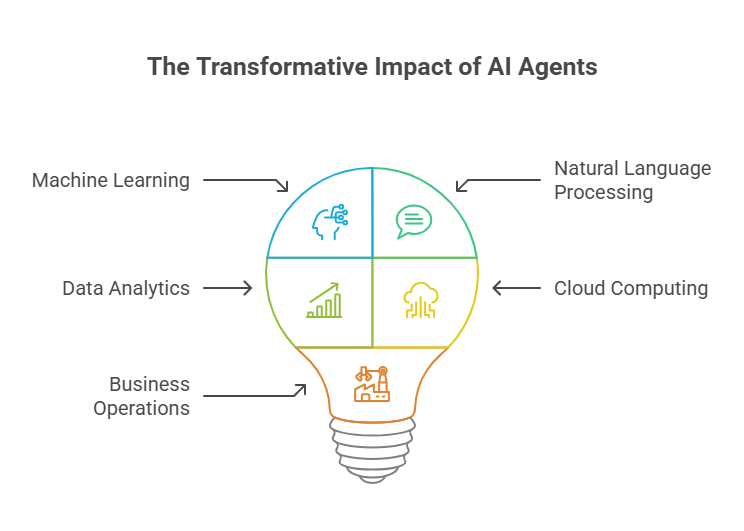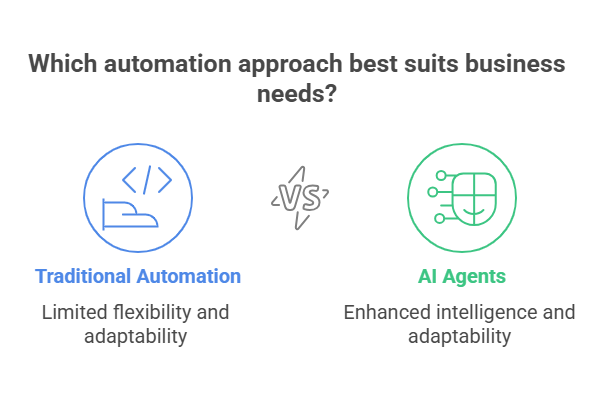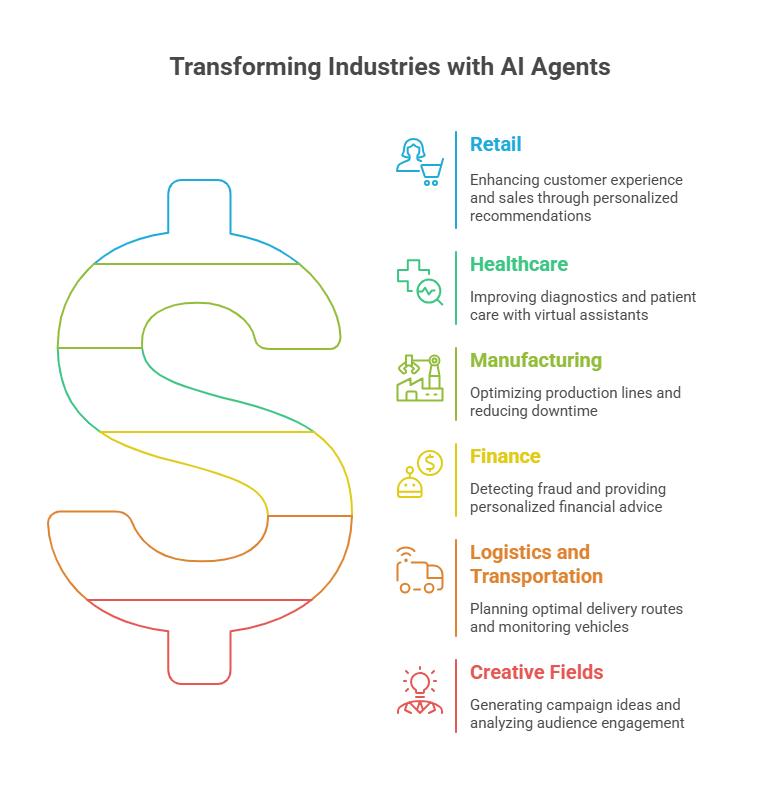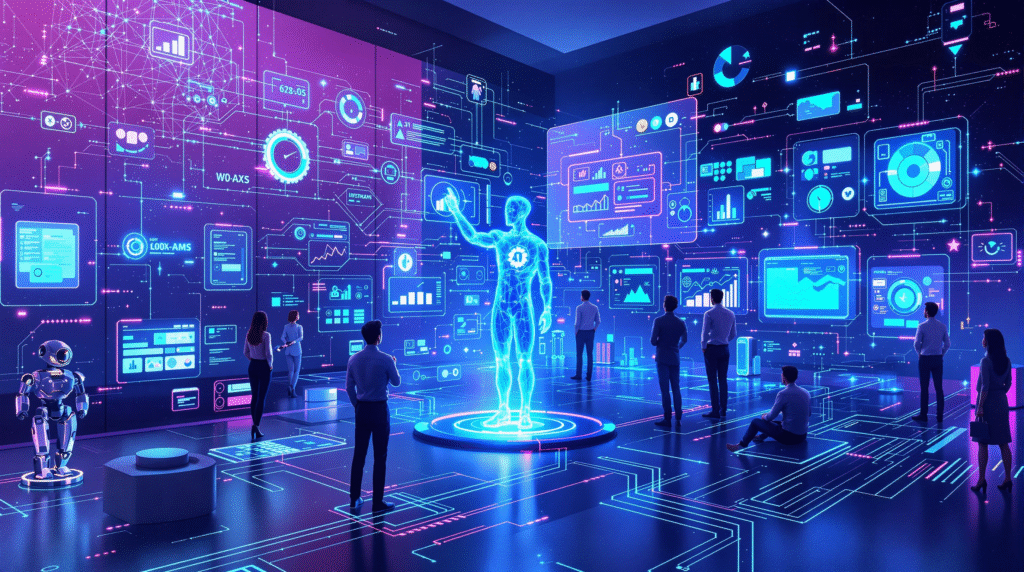Introduction: The Rise of AI Agents in Modern Business
In recent years, artificial intelligence has rapidly transformed from a futuristic concept into a practical tool that is reshaping the business landscape. One of the most significant developments in this field is the emergence of AI agents—autonomous or semi-autonomous systems capable of performing tasks, making decisions, and interacting with humans or other systems. Companies across various industries are increasingly adopting AI agents to streamline operations, enhance customer experiences, and gain a competitive edge.
The rise of AI agents is closely linked to advances in machine learning, natural language processing, and data analytics. These technologies enable AI agents to analyze vast amounts of information, learn from patterns, and adapt to changing circumstances. As a result, businesses can automate complex processes that previously required human intervention, reduce operational costs, and improve the speed and accuracy of decision-making. The growing availability of cloud computing and scalable AI platforms has also made it easier for organizations of all sizes to implement AI agents in their daily operations.

What Are AI Agents? Definitions and Key Concepts
AI agents are software entities designed to perceive their environment, process information, and take actions to achieve specific goals. Unlike traditional automation tools that follow rigid, pre-programmed instructions, AI agents can adapt their behavior based on data, feedback, and changing conditions. This flexibility allows them to handle a wide range of tasks, from answering customer inquiries and managing supply chains to detecting fraud and optimizing marketing campaigns.
Key concepts related to AI agents include autonomy, learning, and interaction. Autonomy refers to the agent’s ability to operate independently, making decisions without constant human oversight. Learning is the process by which agents improve their performance over time, often using techniques such as machine learning or reinforcement learning. Interaction involves communication with users, other agents, or systems, often through natural language or other intuitive interfaces.
There are different types of AI agents, ranging from simple rule-based bots to advanced generative models capable of creative problem-solving. Some agents are designed for specific tasks, while others can handle multiple functions across different domains. As AI technology continues to evolve, the capabilities and applications of AI agents are expected to expand, opening up new possibilities for innovation and efficiency in business.
The Evolution of Automation: From Simple Scripts to Intelligent Agents
Automation in business has a long history, beginning with basic tools and scripts designed to handle repetitive, rule-based tasks. Early automation solutions, such as macros in spreadsheets or simple workflow scripts, were limited in scope and required precise instructions for every possible scenario. These systems brought efficiency gains but lacked the flexibility to adapt to new situations or learn from experience.
With the advent of more advanced computing and the rise of artificial intelligence, automation has evolved far beyond these early solutions. Machine learning and data analytics have enabled systems to recognize patterns, make predictions, and adjust their actions based on real-time feedback. This shift paved the way for the development of AI agents—software entities that combine automation with intelligence. Unlike traditional automation, AI agents can process unstructured data, understand context, and make decisions in dynamic environments. They are capable of learning from new data, improving their performance over time, and handling tasks that require judgment or creativity.
Today, intelligent agents are at the forefront of business automation. They can manage complex workflows, interact with customers in natural language, and even collaborate with human teams. This evolution marks a significant leap from static, rule-based automation to adaptive, self-improving systems that drive innovation and competitiveness.

How AI Agents Transform Business Processes
AI agents are revolutionizing business processes by introducing a new level of intelligence and adaptability. Unlike traditional systems, which often require manual oversight and frequent updates, AI agents can operate autonomously, continuously learning and optimizing their actions. This transformation is evident across various business functions.
In customer service, AI agents such as chatbots and virtual assistants handle inquiries, resolve issues, and provide personalized recommendations around the clock. In supply chain management, intelligent agents analyze data from multiple sources to forecast demand, optimize inventory, and coordinate logistics. In finance, AI agents detect fraudulent transactions, automate compliance checks, and assist with investment decisions by analyzing market trends in real time.
The impact of AI agents extends to marketing, where they segment audiences, personalize content, and optimize campaigns based on user behavior. In human resources, agents streamline recruitment by screening candidates and scheduling interviews. By automating routine tasks and enhancing decision-making, AI agents free up human employees to focus on more strategic and creative work.
Overall, the integration of AI agents into business processes leads to greater efficiency, reduced costs, and improved accuracy. Organizations that embrace these intelligent systems are better positioned to respond to market changes, deliver superior customer experiences, and maintain a competitive edge in an increasingly digital world.
Real-World Applications: Case Studies Across Industries
AI agents are no longer just theoretical concepts—they are actively transforming industries through practical, real-world applications. In retail, for example, AI agents power recommendation engines that analyze customer preferences and browsing history to suggest products tailored to individual tastes. This not only enhances the shopping experience but also increases sales and customer loyalty.
In the healthcare sector, AI agents assist medical professionals by analyzing patient data, supporting diagnostics, and even monitoring patients remotely. Virtual health assistants can answer patient questions, schedule appointments, and provide medication reminders, improving both efficiency and patient outcomes. In manufacturing, intelligent agents optimize production lines by predicting equipment failures, managing inventory, and coordinating supply chains, which leads to reduced downtime and cost savings.
The financial industry benefits from AI agents that detect fraudulent activities in real time, automate trading strategies, and provide personalized financial advice to clients. In logistics and transportation, agents plan optimal delivery routes, monitor vehicle conditions, and adapt to changing traffic patterns, ensuring timely and cost-effective operations. Even in creative fields like marketing and content creation, AI agents generate campaign ideas, write copy, and analyze audience engagement, allowing teams to focus on strategy and innovation.
These examples illustrate how AI agents are being integrated into diverse business environments, delivering tangible value and driving digital transformation across sectors.

Benefits of Implementing AI Agents in Organizations
The adoption of AI agents brings a wide range of benefits to organizations, fundamentally changing how businesses operate and compete. One of the most significant advantages is increased efficiency—AI agents can handle repetitive, time-consuming tasks much faster and more accurately than humans, freeing up employees to focus on higher-value activities. This leads to cost savings, as automation reduces the need for manual labor and minimizes errors.
AI agents also enhance decision-making by processing vast amounts of data, identifying patterns, and providing actionable insights in real time. This data-driven approach enables organizations to respond quickly to market changes, optimize operations, and make more informed strategic choices. Another key benefit is improved customer experience; AI agents offer personalized interactions, instant support, and consistent service, which can boost customer satisfaction and loyalty.
Scalability is another important advantage—AI agents can easily handle increased workloads without a proportional rise in costs or resources. They also support innovation by enabling businesses to experiment with new products, services, and business models that would be difficult or impossible to manage manually. Finally, AI agents contribute to better risk management by monitoring for anomalies, ensuring compliance, and proactively addressing potential issues.
By leveraging these benefits, organizations can not only improve their operational performance but also position themselves for long-term growth and success in an increasingly digital and competitive marketplace.
Challenges and Risks: What to Watch Out For
While AI agents offer significant benefits, organizations must be aware of potential challenges and risks during implementation. Data quality and privacy concerns stand at the forefront of these challenges. AI agents require large amounts of high-quality data to function effectively, and ensuring data security while maintaining compliance with regulations like GDPR can be complex.
Technical integration challenges often arise when implementing AI agents into existing systems. Legacy infrastructure may need significant updates, and ensuring seamless communication between different platforms can be difficult. Here’s a simple example of how to implement basic data validation checks:
python
class DataValidator:
def __init__(self):
self.data_quality_issues = []
def validate_data_quality(self, dataset):
"""
Basic data quality checks for AI agent implementation
"""
try:
# Check for missing values
missing_values = dataset.isnull().sum()
# Check for data types
incorrect_types = []
expected_types = {
'user_id': 'int64',
'timestamp': 'datetime64',
'interaction_data': 'object'
}
for column, expected_type in expected_types.items():
if str(dataset[column].dtype) != expected_type:
incorrect_types.append(f"{column}: expected {expected_type}, got {dataset[column].dtype}")
# Log issues
if len(incorrect_types) > 0 or missing_values.sum() > 0:
self.data_quality_issues.extend([
"Missing values detected: " + str(dict(missing_values[missing_values > 0])),
"Incorrect data types: " + str(incorrect_types)
])
return False
return True
except Exception as e:
self.data_quality_issues.append(f"Validation error: {str(e)}")
return False
# Created/Modified files during execution:
print("data_quality_report.log")Employee resistance and the need for reskilling present another significant challenge. Organizations must invest in training programs and change management to ensure successful adoption. Additionally, there’s the risk of over-reliance on AI systems, which could lead to decreased human oversight and potential errors in critical decisions.
Best Practices for Integrating AI Agents into Business Operations
Successful integration of AI agents requires a structured approach and adherence to best practices. Here’s a practical implementation framework, including code for monitoring AI agent performance:
python
class AIAgentMonitor:
def __init__(self):
self.performance_metrics = {}
self.alert_thresholds = {
'response_time': 2.0, # seconds
'accuracy': 0.95,
'error_rate': 0.02
}
def monitor_performance(self, agent_id, metrics):
"""
Monitor AI agent performance and trigger alerts if needed
"""
try:
# Record performance metrics
self.performance_metrics[agent_id] = {
'timestamp': datetime.now(),
'metrics': metrics
}
# Check against thresholds
alerts = []
for metric, value in metrics.items():
if metric in self.alert_thresholds:
if metric == 'error_rate' and value > self.alert_thresholds[metric]:
alerts.append(f"High error rate detected: {value}")
elif metric == 'accuracy' and value < self.alert_thresholds[metric]:
alerts.append(f"Low accuracy detected: {value}")
elif metric == 'response_time' and value > self.alert_thresholds[metric]:
alerts.append(f"Slow response time detected: {value}")
# Log alerts
if alerts:
self.log_alerts(agent_id, alerts)
return len(alerts) == 0
except Exception as e:
self.log_alerts(agent_id, [f"Monitoring error: {str(e)}"])
return False
def log_alerts(self, agent_id, alerts):
with open('ai_agent_alerts.log', 'a') as f:
for alert in alerts:
f.write(f"{datetime.now()} - Agent {agent_id}: {alert}\n")
# Created/Modified files during execution:
print("ai_agent_alerts.log")Key best practices include:
Start with a clear strategy and well-defined objectives for AI implementation. Organizations should identify specific business problems that AI agents can solve effectively.
Implement robust monitoring and evaluation systems to track AI agent performance and ensure they meet business requirements.
Maintain human oversight and establish clear protocols for when human intervention is necessary. This includes setting up escalation procedures for complex cases.
Invest in continuous training and development, both for the AI agents (through regular model updates and refinement) and for employees who work with them.
Establish strong governance frameworks that address ethical considerations, data privacy, and regulatory compliance.
Create feedback loops to continuously improve AI agent performance based on real-world results and user feedback.
Ensure scalability and flexibility in the implementation to accommodate future growth and changes in business requirements.
These practices help organizations maximize the benefits of AI agents while minimizing risks and ensuring sustainable long-term success. Regular review and adjustment of these practices ensure that the AI implementation remains aligned with business objectives and maintains optimal perfor9. The Future Outlook: Trends and Innovations in AI Agents
The future of AI agents in business is shaped by rapid technological progress and growing expectations for intelligent automation. One of the most significant trends is the rise of generative AI, which enables agents not only to analyze data but also to create new content, solutions, and strategies. This opens up possibilities for AI agents to support creative processes, from generating marketing materials to designing products or drafting legal documents.
Another important direction is the development of multi-agent systems, where several AI agents collaborate, share information, and solve complex problems together. This approach allows for more flexible and scalable solutions, especially in large organizations or industries with intricate processes. The integration of AI agents with the Internet of Things (IoT) is also gaining momentum, enabling real-time monitoring and autonomous decision-making in areas such as logistics, manufacturing, and smart cities.
Personalization and context awareness are becoming standard features, with AI agents adapting their actions to individual users, business goals, and changing environments. Advances in explainable AI (XAI) are making agents’ decisions more transparent and understandable, which is crucial for building trust and meeting regulatory requirements. Additionally, the democratization of AI tools and platforms is lowering the barrier to entry, allowing even small and medium-sized enterprises to benefit from intelligent agents.
Looking ahead, we can expect AI agents to become more autonomous, proactive, and capable of handling increasingly complex tasks. Their role will expand from supporting operations to driving innovation and strategic decision-making, fundamentally transforming how businesses operate and compete.
Conclusion: Embracing the Intelligent Business Revolution
The adoption of AI agents marks a turning point in the evolution of modern business. These intelligent systems are not just tools for automation—they are partners in decision-making, innovation, and growth. By leveraging AI agents, organizations can achieve greater efficiency, agility, and competitiveness, while freeing human talent to focus on creativity and strategic thinking.
However, realizing the full potential of AI agents requires thoughtful implementation, ongoing monitoring, and a commitment to ethical and responsible use. Businesses must invest in data quality, employee training, and robust governance to ensure that AI agents deliver value while minimizing risks.
As technology continues to advance, the organizations that embrace AI agents and adapt to the intelligent business revolution will be best positioned to thrive in a rapidly changing world. The future belongs to those who are ready to collaborate with intelligent agents, harness their capabilities, and shape new standards of excellence in business.
Human and AI: Agents as Creative Partners
Autonomous AI Agents: From Theory to Practice
AI Agents in Practice: Automating a Programmer’s Daily Tasks


